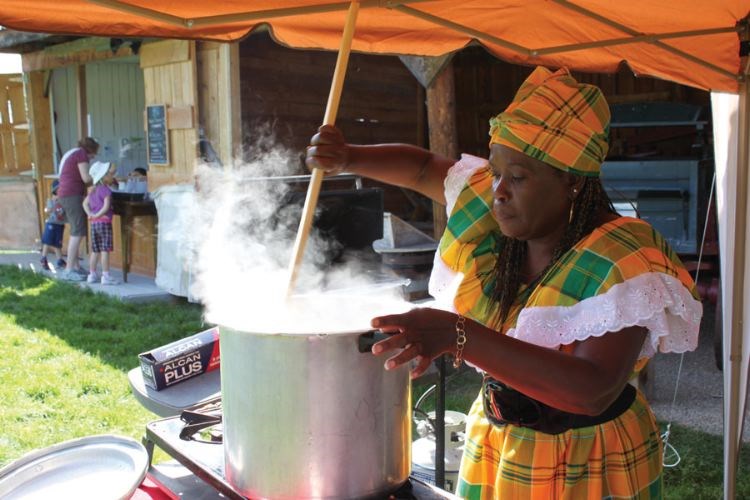Huble Homestead rolled out the Caribbean carpet this weekend in honour of an explorer who popularized an old way of getting around.
The historic site hosted a two-day Giscome Days event on Sunday and the holiday Monday, to celebrate the 150th anniversary of John Robert Giscome's arrival at the portage that now bears his name.
Huble Homestead, while not officially connected with the portage, promotes it because of the context it provides to the site, said operations manager Krystal Leason.
"It's really the portage that is one of the significant reasons [John] Huble and [Edward] Seebach decided to settle here," said Leason, explaining that the business partners rebuilt the road decades after its initial heyday for use in their freighting operation.
The Jamaican-born gold miner was reportedly the first non-aboriginal person to use the trail traversing the continental divide while trying to reach the Peace River area.
Giscome and his Bahamian partner Henry McDame tried to reach the area in the fall of 1862 but were too late to beat the cold weather and had to winter in Fort George. In the spring, they tried again but found themselves deterred by the swollen banks of the Salmon River.
With the help of an aboriginal guide, they were taken to another route known as Lhedesti - 'the shortcut' - which ran about 14.5 kilometres from near the present-day Huble Homestead site and cut across the bush to Summit Lake.
The path was publicized after a letter Giscome wrote highlighting his experience was published in the Times Colonist newspaper in Victoria, but wasn't popular until the Omenica Gold Rush started in 1871.
"At that time people were actually petitioning the government to build a road on it," said Leason.
Giscome Days are more multicultural than some of the Homestead's other events, Leason said, thanks to Giscome's background.
The eldest of three children, Giscome was born in Jamaica in 1832. After working on the Panama Railway, Giscome went on to participate in the California Gold Rush before joining the 1858 migration of black people to Vancouver Island.
St. Lucia native Cynthia Golden spent the weekend preparing and cooking batches of West Indian dishes - rice and peas, jerk chicken and bakes - for the Huble Homestead event.
"It's a privilege to come and share it with everybody," said Golden, who owns Caribbean Alterations above Books and Co. The 20-year Prince George resident along with her friend and friend's daughters also performed Caribbean dancing on Monday afternoon decked out in carnival finery.
First Nations culture also played a big role in the Giscome Days event. "They were using the trail for thousands of years before any Europeans were here to travel between regions to go visit family or to go to different hunting grounds," said Leason. The culturally modified trees bearing marks of traditional activity are continuing proof of that history, she added.
On Oct. 13, the Caledonia Ramblers will lead a guided family hike along the designated Heritage Trail.
"It's a really interesting trail with a fascinating history," said Leason.



